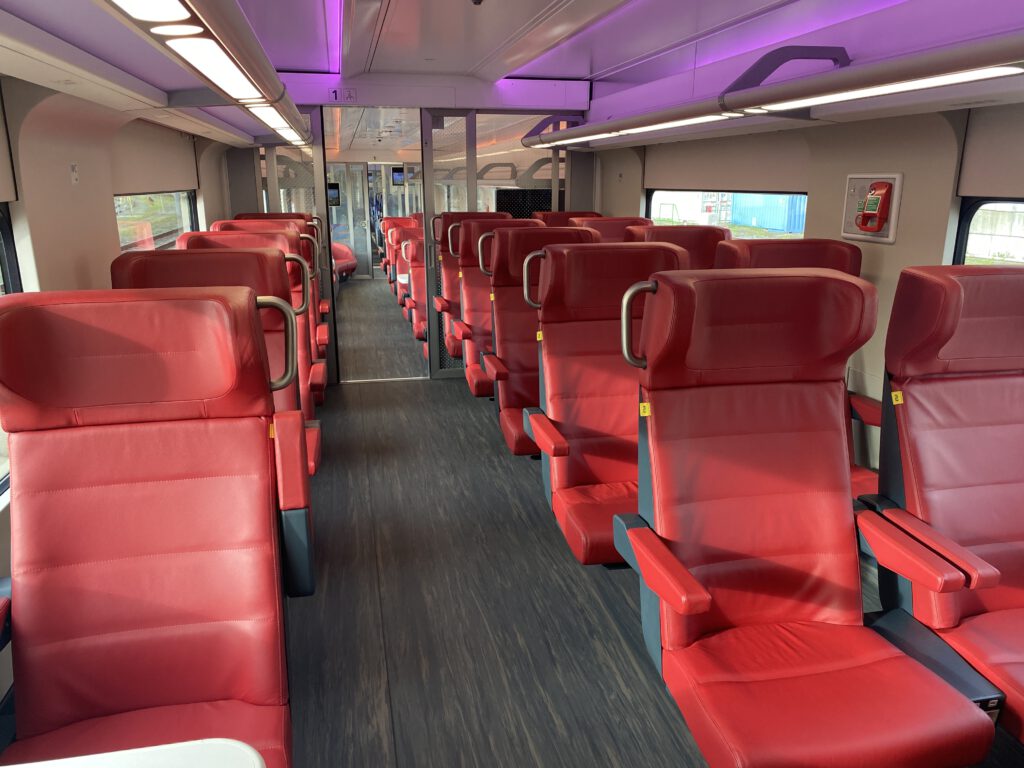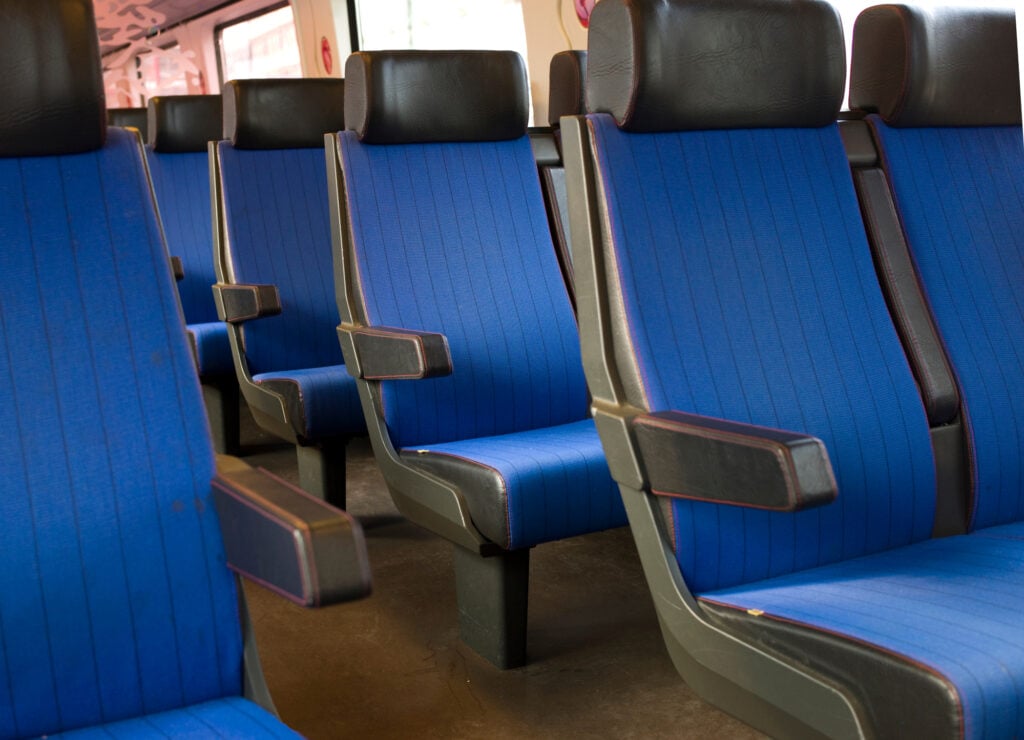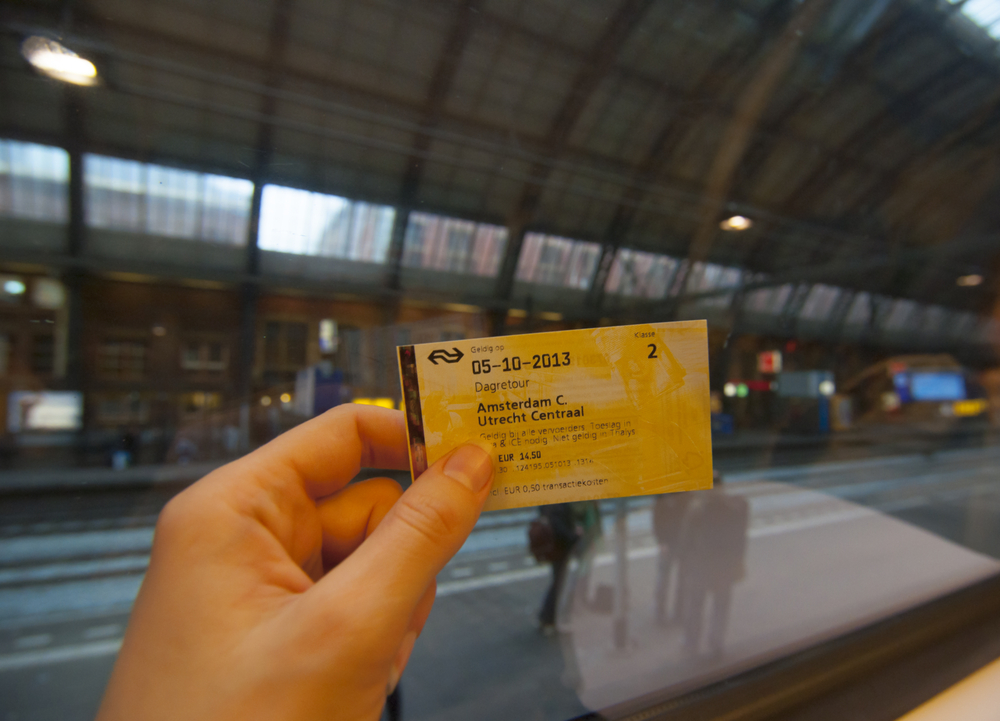The morning commute to your office job is hardly anyone’s favourite part of the day. Standing on the crowded platform, two thoughts might come to mind.
One: If trains were at least twice as long, we wouldn’t have to squeeze between strangers for the next half hour.
And two: Or what if we just got rid of all those oppressive first-class compartments to make more room for the common man?
For a country that prides itself on equality, it seems positively medieval to have a separation between first and second class on trains in the Netherlands.
What’s the difference between first and second class on trains in the Netherlands?
Oh, trust us, we’ve all been wondering the same question. Even when you Google it, it’s hard to find any official differences (that are convincing, anyway).
If you get first-class tickets to an international train departing from the Netherlands, you’re looking at newspapers, complimentary meals and drinks, power outlets, lots of legroom, lounges and TVs. Now that’s something!

However, with normal NS trains, you barely get anything for your fancy ticket. Still, you pay considerably more for the privilege of first class over second class.
For example, to go from Rotterdam to Amsterdam on a normal NS intercity train would cost you around €17.90 each way. This jumps to €30.43 for the same commute in a first-class carriage — a hike of €12.53.
READ MORE | Train etiquette on Dutch trains: 8 things you’ll always see
What do you get for the extra payment? A private carriage, peace and quiet, and a bit more legroom. While that’s neat, that’s pretty much it.
Oh, and if you’ve been smoking weed in Amsterdam, you might wanna check what carriage you’re in before you end up in Brussels.
A brief history of public transport class struggle
So what do we want? Class-free train travel! When do we want it? Now! 🙋♂️
Supporters of these egalitarian ideals may be encouraged knowing that the Netherlands is, in fact, already on a path to class-free travelling.
READ MORE | 17 places you can get to by TRAIN from the Netherlands
Originally, the Dutch railway system had no less than three classes. Some considered this a reflection of 19th-century Dutch society, made up of dignitaries, citizens, and workers. This was reduced to the now familiar two classes in 1956.
Some Dutch politicians would like to take this one step further and call for a complete ban on class division in public transport.
The SP (Socialist Party) took this matter to parliament back in 2013, arguing that the current first/second class division is both outdated and inefficient.
They argued that letting travellers sit wherever they want would be a win-win scenario: travellers would be happier, and Dutch railway companies would be richer. Sounds pretty good!
First class and second class train travelling in the Netherlands: the debate continues
Giving travellers the option to pay more or less for a ticket depending on how much comfort they want should not be controversial.
After all, we can choose how much money we want to spend on a seat in a theatre, concert hall, or sports stadium.

Others may argue over whether levelling the ticket price would improve the overall train quality.
Railway companies charge 40% extra on first-class tickets, and a loss of that income has to be compensated somehow. And no one wants to lose the possibility to score on cheap train tickets.

So, like a lot of often-returning discussions, the final stop hasn’t been called on this ride. Maybe the class division is here to stay.
READ MORE | What your favourite Dutch mode of transport says about you
Or perhaps one day… we will see the humble labourer sitting side by side with the stately millionaire — awkwardly avoiding eye contact by staring at their smartphone.
What are your thoughts on the class division in Dutch trains? Tell us in the comments below!






We like first class. It’s mostly very quiet and there is always room to sit.
This has nothing to do with classes. Just market. When you want more space and comfort you simply pay for it. Same you do by many airlines.
You’ve just justified why it does have to do with classes. Not everyone has the privilege of paying more when they want it (or traveling by plane, for that matter). And this is critical when talking about an essential public service. The train is no cinema or concert where people can use their disposable income for fun.
It is the same as economy, premium economy, business and first class in air travel. Yes, the passengers get more comfort and better food during the journey, but the real reason is that the non economy classes are a much better profit opportunity for the carriers. The same applies to train travel, and the funny thing is that it is always about bringing everything down to the lowest common denominator. It is a stupid attitude, that completely disregards that some people can only afford a Trabant whilst others can afford a Bentley. Note that it is never the Bentley drivers who have a compelling desire to drive a Trabant, it is always the Trabant drivers who want everyone to drive one, as if that is going to improve anything. Product of misplaced jealousy.
The primary difference between first and second class on Intercity Dutch trains is noise. Yes, the seats are slightly nicer and there is a bit more legroom, but the difference is more about quiet than luxury. Second class compartments can be pretty lively and loud around busy hours. I think having an area where quiet is emphasized is a good thing for those who want it.
Wouldn’t it be nice if it was a stately laborer and a humble millionaire instead
I prefer first class IF it has a six person compartment on that run, if not, not. – Silent sections are great but the penalty for having a phone go off or carrying on a conversation should be confiscation of the offender’s OV card a three month ban from using the train.
I support to have 1st and 2nd class on train seats not mean in people, I have a choice like when I travelling with the business people like to have a better environment to talk and social, on my daily commute I on 2nd, and someday I like to open my laptop to work a little I change to First, I have a choice
I agree that this is not a genuine issue of social class but of some individuals preferring allocating their assets to travelling in less crowded cars. For me, this is especially important in these covid times where I am one of the very few who wear a mask on public transport. I don’t own a car, which ownership is far more expensive than the train and not environmentally sustainable. At the opera, I prefer the cheapest seats at the top of the upper balcony because I think it has the best acoustics. Those who like to sit up close subsidise my attendance; and, I don’t mind subsidising those who travel 2nd class on the trains. Politically, I am left of centre. Not everything needs to be viewed through the lens of social classes. Would it not be more to that point to restore the Dutch Republic and turn the palaces into cultural and educational institutions and, why not, affordable housing?
Most of the commenters are missing the point of the article, which is that most 1st class compartments are empty. The NS seems to be providing a service not many people want, except for some of the commenters here. It isn’t a matter of getting rid of the separate classes, but making the best use of trains for everyone. There will always be people who can afford a high price to have private space. If one person is willing to pay 200 Euro’s to have the whole compartment to himself, that makes perfect sense from a free market point of view, but not for a society, like NL that values making the best use of space which benefits society the most. Remember, squatters have rights here and you cannot keep living space empty just because you can afford to. If there is a housing shortage, you can’t buy property without filling it with yourself or renters, etc. The same concept should apply to the trains. If there is a shortage of space in 2nd class, while very few people are buying 1st class tickets, get rid of first class. In other words, fill up 1st class or get rid of it. (Btw, if 2nd class is overcrowded and 1st class is empty, we sit in 1st. Screw it.)
I’m sorry, but why has this article even been written. I usually book second class, but there are these moments where I really need peace of mind (e.g. weekends). So first class becomes a bliss. Yes first class barely has any difference compared to Germany or the UK, but peace of mind and a guaranteed seat is priceless.
Jonathan? You seem to have dissapeared from the earth’s surface… What’s going on? Are you ok???
You’re full of shit, mate. Your proof picture above which states that people sit on the floor while the supposed ‘first class’ is empty as you show above, is made of a train that doesn’t even run services for passengers yet. Get your shit together before claiming all kinds of things to your favor, thanks.
Honestly ,it’s a matter of choice or preference.i don’t see it as anything unusual ..my only concern is when there are fewer trains running and thereby causing alot of backlog of passengers from a cancelled time schedule,in such situations, I expect the train conductors to allow people to make use of the First -class seats instead of so many people struggling to even walk past each other while trying to locate a sitting position …I wish they consider this pleas from passengers …thanks
The first class sections are larger than the 2nd class and in my experience hardly have any people in them! I am unclear how NS make profit on those sections or can argue efficiencies. Why not compromise reduce 1st class section to 1-2 trains and cut the size. Especially these days with such reduced services. Id rather buy a car or cycle these days.
Considerinf how shitty the trains are, nowadays, from the cleanliness perspective, the discussion re 1st and 2nd class is irelevant. I believe that NS should first clean the damn trains and only thereafter they should consider such minor topics.
For travelers utilizing the train with luggage (medium sized cases with wheels) – Is the extra money for first class worth it just to be able to have room for our luggage?
So I am from the U.S. and not familiar with train travel. I will be traveling between AMS and ROTT and rolling on a large and small suitcase with me. Would it be advisable to get a 1st class ticket? Where do they keep the luggage?
It’s not just a Dutch thing. Other countries have 1st and 2nd class on trains as well.
There is a prudent solution to the perceived problem. The so called commuter trains must be classless, while a long distance trains should have a luxury cars. Usually commuter trains are short distance i.e. under 1 hour plus. If train network is dance and such determination is hard to make, then the morning trains are the commuter trains.
Based on the video in the article, the NS has moved to trainset operations. That shall not allow for modifications of the train composition. The number of certain car class in trainset is given. Therefore the only solution for Nederland is to let 2nd class passengers in 1st class cars during so called rush hours.
This is the opinion of someone worked for 28 years for Metro-North Railroad, NY STATE
I’m writing this whilst sat in one those very first class compartments in Amsterdam. We’ve traveled all week in first class and nobody has said anything. Quieter? Perhaps… More leg room? A bit…. I say scrap the entire class thing. Just get these compartments opened up to all… We’re back in England soon. Back to the place where trains don’t even turn up! 😁